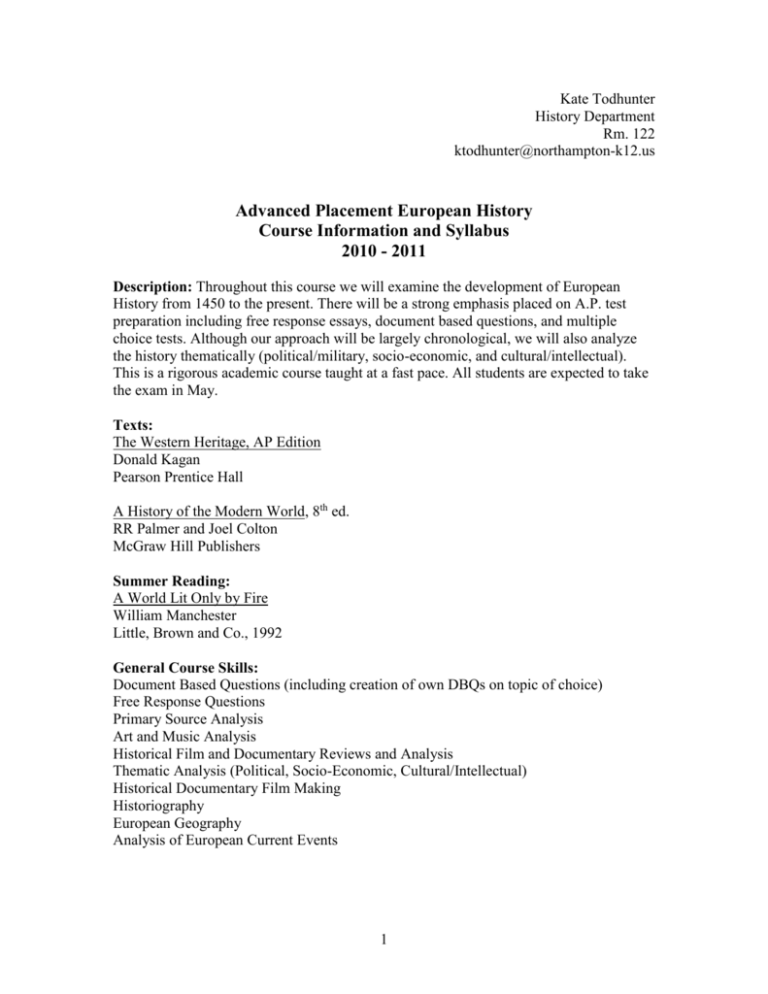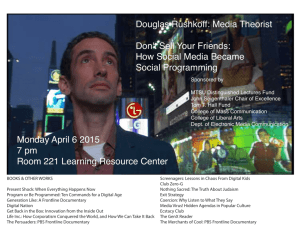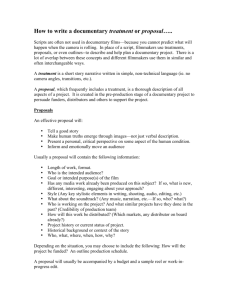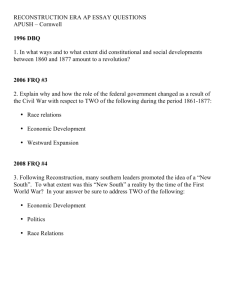
Kate Todhunter
History Department
Rm. 122
ktodhunter@northampton-k12.us
Advanced Placement European History
Course Information and Syllabus
2010 - 2011
Description: Throughout this course we will examine the development of European
History from 1450 to the present. There will be a strong emphasis placed on A.P. test
preparation including free response essays, document based questions, and multiple
choice tests. Although our approach will be largely chronological, we will also analyze
the history thematically (political/military, socio-economic, and cultural/intellectual).
This is a rigorous academic course taught at a fast pace. All students are expected to take
the exam in May.
Texts:
The Western Heritage, AP Edition
Donald Kagan
Pearson Prentice Hall
A History of the Modern World, 8th ed.
RR Palmer and Joel Colton
McGraw Hill Publishers
Summer Reading:
A World Lit Only by Fire
William Manchester
Little, Brown and Co., 1992
General Course Skills:
Document Based Questions (including creation of own DBQs on topic of choice)
Free Response Questions
Primary Source Analysis
Art and Music Analysis
Historical Film and Documentary Reviews and Analysis
Thematic Analysis (Political, Socio-Economic, Cultural/Intellectual)
Historical Documentary Film Making
Historiography
European Geography
Analysis of European Current Events
1
Course Overview and Course Units
Unit I: The Upheaval in Christendom (1300 – 1560)
Key Concepts and Themes:
European Geography
14th century disasters and their socio-political consequences/impacts
The Italian Renaissance: origins, events and impacts
Medici family
New attitudes of the Renaissance and reason for their rise
Renaissance ideals and Humanism
Key philosophers and artists of the Renaissance
Distinctions between Northern and Italian Renaissance
Rise of New Monarchies in France, England, Spain and the Holy Roman Empire
The Protestant Reformation: origins, events, new faiths, and impacts
The Catholic/Counter Reformation: origins, events, Council of Trent, and impacts
Assignments and Assessments:
Kagan chapter 9, 10, 11
DBQ on The Black Death
Quiz on current map of Europe
A World Lit Only By Fire in-class essay
Reading from A History of Money: Knights of Commerce (J. Weatherford)
Primary Source Analysis: Erasmus, Machiavelli, Mirandola, de Pisan,
Renaissance Art slides, Martin Luther
Documentary/Film Analysis: “The Medici: Godfathers of the Renaissance”
(PBS), “Six Wives of Henry VIII” (PBS)
FRQ on Legacies of Renaissance Humanism
Unit Test including FRQ
Unit II: Economic Renewal and Wars of Religion (1560 – 1648)
Key Concepts and Themes:
Motives for and impacts of Age of Exploration
The Commercial Revolution
Price Revolution
Mercantilism
Changing social structures and education
Philip II and Catholic Spain
Revolt of the Netherlands
Spain’s decline: origins and impacts
The disintegration and reconstruction of France
French Religious Wars: origins, events and impacts
2
The Disintegration of Germany and the Thirty Years War
Great Witch Hunt
Treaty of Westphalia
Assignments and Assessments:
Kagan chapter 12
Readings: Weatherford, Landes, Diamond
Primary Source Analysis: Saint Bartholomew’s Day Massacre, Bach, Baroque,
early folktales
Documentary/Film Analysis: “Guns, Germs and Steel” (PBS), “The Virgin
Queen” (PBS), “Queen Margot” (France)
Unit Test including FRQ
Unit III: The Establishment of West-European Leadership
Key Concepts and Themes:
Balance of Power
Golden Age of the Dutch Republic
Britain’s Puritan Revolution and the rise of Parliament
The Stuarts and Restoration
The Glorious Revolution: origins and impacts
France under Louis XIV: events and impacts
Absolutism
Wars of Louis XIV: events and impacts
Peace of Utrecht
Assignments and Assessments:
Kagan chapter 13, Palmer chapter 4
Primary Source Analysis: Baruch Spinoza, Dutch Masters (Vermeer, Rembrandt),
James I, English Bill of Rights, Duc de St. Simon
DBQ on Dutch Republic
Unit Test including FRQ
Unit IV: The Transformation of Eastern Europe
Key Concepts and Themes:
Aging Empires (Holy Roman Empire, Republic of Poland, Ottoman Empire)
Formation of Austrian Monarchy
Formation of Prussia
The “Westernizing” of Russia
The Partitions of Poland
3
Assignments and Assessments:
Kagan, Palmer chapter 5
Group Poster/PowerPoint Presentation of New States
Primary Source Analysis: Stenka Razin
Documentary/Film Analysis: “Peter the Great” (PBS)
Unit V: Age of Genius
Key Concepts and Themes:
Scientific Revolution: origins, key scientists, impacts
Bacon, Descartes and the Scientific Method
Impacts of Newton
Rise of Skepticism
Political Theory and the School of Natural Law: Locke and Hobbes
Assignments and Assessments:
Kagan chapter 14, Palmer chapter 7
Primary Source Analysis: Descartes, Galileo, Locke, Hobbes
DBQ on attitudes towards women scientists
Documentary/Film Analysis: “The Medici: Godfathers of the Renaissance”
(PBS), “NOVA: Newton’s Dark Secrets” (PBS)
Unit Test including FRQ
Unit VI: The Enlightenment
Key Concepts and Themes:
The Philosophes
Causes and impacts of the Enlightenment
Enlightened Despotism of France, Austria, Prussia and Russia
British Reform Movement
Rise and influence of Salon society
The “Reading Revolution”
Assignments and Assessments:
Kagan chapter 17, Palmer chapter 8
Primary Source Analysis: Kant, Voltaire, Rousseau, Montesquieu, Mozart, Mary
Wollstonecraft
Enlightened Despot group presentations
Salon seating chart activity and debate
Documentary/Film Analysis: “Catherine the Great” (PBS), “Amadeus” (USA)
Unit Test including FRQ
4
Unit VII: The French Revolution
Key Concepts and Themes:
Background, causes and impacts
The First and Second Revolutions
The War with Europe and “International” Revolution
Robespierre and the Reign of Terror
The Directory
The Consulate
Role of class and gender in the Revolution
Assignments and Assessments:
Kagan chapter 18, Palmer chapter 9
Primary Source Analysis: Arthur Young and l’ancien regime, Abbe Sieyes,
Declaration of the Rights of Man and the Citizen, Olympe de Gouges, La
Marseillaise, Thomas Paine, Edmund Burke, Marat
FRQ on socio-economic impacts of the French Revolution
Documentary/Film Analysis: “Ridicule” (France), “The French Revolution”
(History Channel)
Unit Test including FRQ
Unit VIII: Napoleonic Europe
Key Concepts and Themes:
Rise and fall of Napoleon Bonaparte: causes and impacts
Formation of the French Imperial system
The Grand Empire and spread of the Revolution
The Continental System
National Movements in Germany, Spain and Italy
Congress of Vienna
Neoclassicism
Assignments and Assessments:
Kagan chapter 19, Palmer chapter 10
Primary Source Analysis: Jacques Louis David, Napoleonic Code
Napoleonic Europe map activity
Documentary/Film Analysis: “Napoleon” (PBS)
FRQ on Napoleon as enlightened despot, dictator or son of the Revolution
Unit Test including FRQ
5
Unit IX: Reaction versus Progress and the Industrial Revolution (1815 – 1848)
Key Concepts and Themes:
Major causes and impacts of industrialization
Industrial Revolution in Britain: origins and impacts
Romanticism
Liberalism
Nationalism
Socialism
Feminism
Reactions and Conservatism: impacts of Metternich
Rise of the Bourgeoisie
Irish Potato Famine
Abolition of Slavery
Assignments and Assessments:
Kagan chapters 20 and 21, Palmer chapter 11
Primary Source Analysis: Beethoven and key Romantics, John Stuart Mill,
Brothers Grimm
“Letters to the Editor” Essay on political “isms”
Documentary/Film Analysis: “Germinal” (France)
Unit Test including FRQ
Unit X: Revolutions of 1848 and Impacts (1848 – 1870)
Key Concepts and Themes:
Causes of 1848 revolutions
Events in France (Louis Philippe through Louis Napoleon Bonaparte)
Events in Austrian Empire
Events in Germany (failures at unification, Frankfurt Assembly)
Realism (politics, art, literature)
Rise of Socialism (Owen to Marx)
Assignments and Assessments:
Palmer chapter 12
Primary Source Analysis: Marx’s journalistic writings on France, Communist
Manifesto, Comte, Emile Zola, Realism art slides
Documentary/Film Analysis: “The Horseman on the Roof” (France)
Unit Quiz
Mid-term Exam (AP Released Exam 1999)
6
Unit XI: European Civilization and the Rise of the Nation States (1859 – 1871)
Key Concepts and Themes:
Nationalism and rise of the Nation State
Crimean War: origins and impacts
Cavour and the Unification of Italy
Bismarck and the Founding of the German Empire
The Dual Monarchy of Austria-Hungary
The Liberalization of Tsarist Russia under Alexander II
Demography and 19th century population trends
Second Industrial Revolution and rise of the world market
Advances in Democracy under the Third French Republic, Great Britain and
Bismarck’s Germany
Rise of Labor Unions and Socialism
19th century advances in science
England’s Queen Victoria and the Victorian Era
Life in the newly urbanized society
19th century changes in social class
Jewish Emancipation and the Dreyfus Affair
Assignments and Assessments:
Kagan chapter 22, Palmer chapters 13 and 14
Nation State Documentary Projects (Austria-Hungary, Russia, Germany and Italy)
Documentary/Film Analysis: “1900 House” (PBS)
Reading: The History of Money: The Gold Bug (J. Weatherford)
DBQ on Russian Peasantry
Primary Source Analysis: Tzar Alexander’s Act of Emancipation, Darwin’s
Origin of Species, Huxley’s Social Darwinism, Nietzsche, Syllabus of Errors,
Post-Impressionism art slides
Unit Test including FRQ
Unit XII: Imperialism
Key Concepts and Themes:
Nature and causes of the new imperialism
Rise of European Empire and world supremacy
Impacts of Empire upon Europeans
Russo-Japanese War
Assignments and Assessments:
Palmer chapter 15
Primary Source Analysis: Kipling’s White Man’s Burden, The Secret of
England’s Greatness, Conrad’s Heart of Darkness
7
Documentary/Film Analysis: “This Magnificent African Cake” (B. Davidson),
“Guns, Germs and Steel” (PBS)
Unit XIII: World War I
Key Concepts and Themes:
Role of alliances and other causes of the first World War
Major military campaigns of the war and armed stalemate
Concept of Total War
Armenian Genocide
Home Front experiences
Collapse of Russia and U.S. intervention
Collapse of Austrian and German empires
Economic and social impacts of the war
1919’s Peace of Paris
Assignments and Assessments:
Kagan chapter 25, Palmer chapter 16
Pre and Post-War geography of Europe
Primary Source Analysis: Otto Dix and Expressionism, photos and writings from
the War, The Treaty of Versailles
Documentary/Film Analysis: “The Great War” (PBS), “The Armenian Genocide”
(PBS),
Unit Test including FRQ
Unit XIII: The Russian Revolution and the Soviet Union
Key Concepts and Themes:
Background and causes of the Revolution
The Revolution of 1905
Leninism
The Events of the Revolutions of 1917
The Creation of the Soviet Union
Stalin’s Five-Year Plans, Collectivization, Purges and Totalitarianism
International Communism
Assignments and Assessments:
Kagan chapter 26, Palmer chapter 17
Reading: Harvest of Sorrow (Conquest)
Primary Source Analysis: Bloody Sunday, Lenin’s Cult of Personality (speeches,
photographs), Mandelstam, Kollontai
Documentary/Film Analysis: “Rasputin” (A&E Biography), “The Great War”
(PBS), “Burnt By the Sun” (Russia)
8
Unit Test including FRQ
Unit XIV: The Age of Anxiety and the Interwar Period
Key Concepts and Themes:
Advances in Democracy and Locarno
Weimar Republic
Ataturk and rise of secularism in Turkey
The Great Depression
Mussolini and Italian Fascism
Germany’s Third Reich, Nazism and Hitler
Totalitarianism
Existentialism (philosophy, art, literature and culture)
Surrealism
Spanish Civil War
Women’s Suffrage Movement
Assignments and Assessments:
Kagan chapter 27, Palmer chapters 18 and 19
Primary Source Analysis: Valery, Stravinsky, Hyperinflation in Weimar,
Guernica, Mussolini, Goebbels, Nuremberg Laws, Nazi propaganda
Documentary/Film Analysis: “The Century”
FRQ on Women’s Suffrage Movement and Political Feminism
Unit XV: World War II
Key Concepts and Themes:
Weakness of Democracy
Events leading up to War (Versailles through invasion of Poland)
Policy of Appeasement
Opening stages of the War and Axis triumphs, Blitzkrieg and the Battle of Britain
Nazi-Soviet Pact
The Holocaust
Western-Soviet Victory
Stalingrad
Aftermath of War and impacts
Foundations of Peace (Teheran, Yalta and Potsdam)
Assignments and Assessments:
Kagan chapter 28, Palmer chapter 20
Primary Source Analysis: Dr. Seuss political cartoons, Vonnegut’s
Slaughterhouse Five
Documentary/Film Analysis: “Genocide” (BBC World at War Series),
9
Historical Film Review on Holocaust/World War II
Field Trip: Hatikvah Holocaust Education Center and survivor visit
Unit Test including FRQ
Unit XVI: The Cold War and European Culture (1945 - 1985)
Key Concepts and Themes:
Origins of the Cold war
Truman Doctrine
United Nations
NATO
Warsaw Pact
Korean War
Marshall Plan
Rise of Christian Democrats
Treaty of Rome and the Common Market
European Union
Soviet efforts at Reform (Khrushchev through Brezhnev)
Soviet domination of Eastern Europe
Soviet-American Relations (1955 – 1975)
Policy of Détente
Global Economy
Policy of Deterrence
Nuclear Arms Race
Irish Home Rule (postwar)
Second Wave of Women’s Rights Movement
Counter and Youth Culture
Assignments and Assessments:
Kagan chapter 29, Palmer chapters 21 and 23
Reading packets on Cold War, Irish history, women’s movement and youth
culture
Documentary/Film Analysis: “Bloody Sunday” (Ireland)
Primary Source Analysis: W. Churchill’s Iron Curtain Speech
Unit XVII: Europe after the Cold War (1989 – 1995)
Key Concepts and Themes:
Crisis in the Soviet Union
Gorbachev, Perestroika and Glasnost
Eastern European Revolutions of 1989
Collapse of Communism
10
Boris Yeltsin’s CIS
Post-Communism transitions (rise of market economies, nationalism,
immigration)
German Reunification
Dissolution of Yugoslavia and the Bosnian War
Assignments and Assessments:
Kagan chapter 30, Palmer chapter 24
Documentary/Film Analysis: “Good Bye, Lenin” (Germany) or “No Man’s Land”
(Yugoslavia)
Unit Test (1945 – 1995) including FRQ
Final DBQ Project
A.P. Modern European History Exam Review
11







